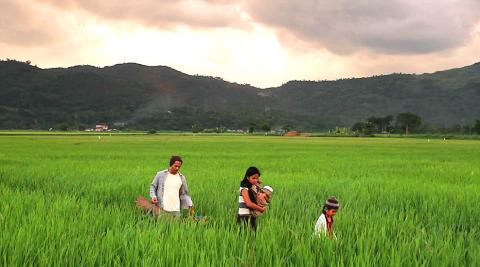Britain’s nominee as Best Foreign Language Film for the Oscars features an all-Filipino cast and a story that traces the sacrifices and hopes of an impoverished family from the countryside that tries its luck in the dark and squalid ghettos of the Philippine capital Manila.
Metro Manila, written and directed by Briton Sean Ellis, is one of three foreign language films nominated in the best foreign language category for next year’s Oscars which delves into the lives of Filipinos.
The Philippines’ nominee Transit focuses on the struggles of migrant Filipino workers in Israel, while Singapore’s entry Ilo Ilo is about a Filipino nanny who works for a Singaporean family.

Photo: AFP
The US film academy will select the finalists in January ahead of the Oscar ceremony on March 2.
“I thought it was a very beautiful and poetic story about family and about sacrifice and about hope,” Ellis said of his movie, which won an audience award at the recent Sundance Film Festival. The movie premiered in Manila last week and opens in Philippine cinemas on Wednesday.
It tells of the journey of farmer and former soldier Oscar Ramirez, played by veteran stage actor Jake Macapagal, and his young family from the rice terraces in the rural north of the country to the chaos of Manila to seek a better life.

Photo: AFP
In the city, they fall prey to various characters and are forced out of desperation to make difficult choices. Oscar’s wife, Mai, played by film actress Althea Vega, is forced to become a bar girl to feed her two young children.
Oscar manages to land a job as a driver for an armored truck company and is befriended by Ong, his senior officer. Ong — played by John Arcilla — is helpful and jolly, but it becomes clear he had been waiting for someone naive and trusting like Oscar to come along.
Ellis said the story was inspired by a scene he witnessed while visiting the Philippines. Two employees of an armored truck company, in bulletproof jackets and helmets, and lugging M16 rifles, were screaming at each other. It ended with one of them kicking the truck before they both got in and drove off.
He said the scene remained with him when he returned to Britain and he kept on wondering what they were arguing about. That led him to develop a 20-page synopsis. He then flew to Los Angeles to flesh out the script with his friend Frank E. Flowers.
The script was in English, but Ellis allowed the actors to translate their lines into Tagalog.
Ellis said it was strange to direct a movie in a language he could not understand, but for only “about five seconds, because then you start to see the performance and you’re not worried about the words they’re saying, you trust them to say the words that are in the script.”
Macapagal, 47, who spent a decade in Europe working in the musical stage production Miss Saigon, said the role was “challenging but not very far from every Filipino’s plight.” Macapagal said he could easily relate to Oscar’s life because he does not come from a privileged background.
Manila’s dark side has been explored in several films by Filipino directors, including the classic 1975 film Manila, in the Claws of Light by the late award-winning director Lino Brocka, and more recently by noted director Brillante Mendoza.
“There’s a texture in our city that we don’t normally see because there are times we numb ourselves to the poverty,” Macapagal said, adding Ellis “looks at things you don’t normally look at.”
Arcilla said the poverty shown in the movie can be found in slums in many countries. “For me it’s not really about poverty, its more on human survival and more on human sacrifice,” he said.
Vega, 25, said it was a story about taking chances and making desperate choices to survive.

The primaries for this year’s nine-in-one local elections in November began early in this election cycle, starting last autumn. The local press has been full of tales of intrigue, betrayal, infighting and drama going back to the summer of 2024. This is not widely covered in the English-language press, and the nine-in-one elections are not well understood. The nine-in-one elections refer to the nine levels of local governments that go to the ballot, from the neighborhood and village borough chief level on up to the city mayor and county commissioner level. The main focus is on the 22 special municipality

Words of the Year are not just interesting, they are telling. They are language and attitude barometers that measure what a country sees as important. The trending vocabulary around AI last year reveals a stark divergence in what each society notices and responds to the technological shift. For the Anglosphere it’s fatigue. For China it’s ambition. For Taiwan, it’s pragmatic vigilance. In Taiwan’s annual “representative character” vote, “recall” (罷) took the top spot with over 15,000 votes, followed closely by “scam” (詐). While “recall” speaks to the island’s partisan deadlock — a year defined by legislative recall campaigns and a public exhausted

Hsu Pu-liao (許不了) never lived to see the premiere of his most successful film, The Clown and the Swan (小丑與天鵝, 1985). The movie, which starred Hsu, the “Taiwanese Charlie Chaplin,” outgrossed Jackie Chan’s Heart of Dragon (龍的心), earning NT$9.2 million at the local box office. Forty years after its premiere, the film has become the Taiwan Film and Audiovisual Institute’s (TFAI) 100th restoration. “It is the only one of Hsu’s films whose original negative survived,” says director Kevin Chu (朱延平), one of Taiwan’s most commercially successful

In the 2010s, the Communist Party of China (CCP) began cracking down on Christian churches. Media reports said at the time that various versions of Protestant Christianity were likely the fastest growing religions in the People’s Republic of China (PRC). The crackdown was part of a campaign that in turn was part of a larger movement to bring religion under party control. For the Protestant churches, “the government’s aim has been to force all churches into the state-controlled organization,” according to a 2023 article in Christianity Today. That piece was centered on Wang Yi (王怡), the fiery, charismatic pastor of the